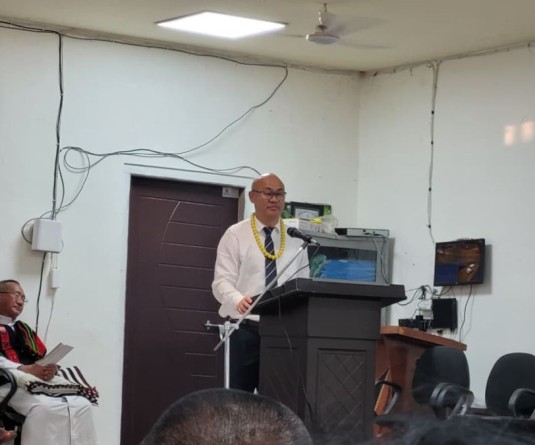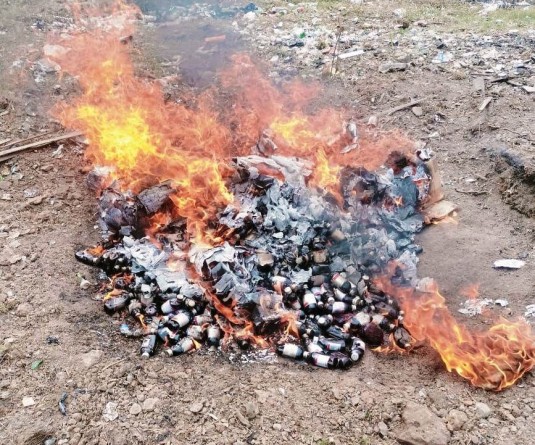D E. Motsuthung Patton, Principal Director and Dr L. A. Singh, Senior Regional Director of RoHFW, Imphal with NVBDCP state and district staffs.
KOHIMA, MARCH 20 (MExN): The two-day state review meeting of the National Vector Borne Disease Control Programme (NVBDCP) commenced today at the Directorate of Health and Family Welfare in Kohima. The meeting brought together health officials and stakeholders from across the state to assess the ongoing efforts in controlling vector-borne diseases, particularly malaria.
Dr E. Motsuthung Patton, Principal Director of the Directorate of Health and Family Welfare, addressed the gathering at the inaugural event. He commended the state's progress in reducing malaria cases, pointing out that the declining number of cases is a result of the collective efforts, dedication of healthcare workers, and commitment of district authorities. Dr Patton emphasized that while the achievements were commendable, there is still work to be done in the fight to eliminate malaria completely.
Dr Patton stressed the importance of districts taking proactive steps to prepare for malaria elimination certification. He explained that this process requires careful documentation, thorough reporting, and strict adherence to prescribed guidelines. He urged districts to expedite the preparation of the necessary records to ensure readiness for the Malaria Sub-Elimination Committee's verification process. He underscored that certification is not just a recognition but a validation of the state's commitment to public health and the eradication of malaria.
Nagaland’s leadership in malaria elimination efforts in the Northeast was also highlighted by Dr Patton. He urged stakeholders to maintain the state’s momentum, particularly as other northeastern states are also making rapid progress toward malaria elimination. Dr Patton emphasized that the target for malaria elimination in the region is set for 2027, with the goal of sustaining the elimination efforts through 2030.
In addition to malaria, Dr Patton expressed concern about other vector-borne diseases, particularly Japanese Encephalitis (JE) and Dengue. He pointed out the dengue outbreak in 2023 as a stark reminder that complacency could lead to future challenges. He stressed the importance of strengthening prevention and control strategies for JE and Dengue, including improving surveillance, early detection, community awareness, and vector control measures.
Dr L. A. Singh, Senior Regional Director of RoHFW, Imphal, also acknowledged Nagaland’s success in reducing malaria cases, noting that it is a significant achievement that no other state in the region has accomplished. He urged the state to work towards obtaining malaria elimination certification at the sub-elimination level. Dr Singh informed the gathering that a national-level committee has been established to oversee the malaria elimination certification process. He explained that the committee would visit districts and health units to assess the documentation and efforts, and certification would be granted once they are satisfied with the preparations. He emphasized that districts must maintain proper records and strictly follow the guidelines to achieve this certification.
Dr Neisakho Kere, Joint Director and State Programme Officer (SPO) of NVBDCP, provided a historical overview of the state’s malaria situation. He recalled that in 2009, Nagaland recorded its highest number of malaria cases, with 8,489 cases and 35 deaths. Since the launch of the malaria elimination program in 2015, following NVBDCP Delhi’s guidelines, the number of cases has declined significantly. He noted that no malaria-related deaths have been recorded since 2016. In 2024, only five malaria cases were reported, with districts such as Mokokchung, Peren, Phek, and Zunheboto identified as focus areas for continued surveillance and monitoring. Dr Kere also highlighted that Longleng has not reported a single malaria case in the past five years, making it eligible for malaria elimination certification.
As Nagaland nears the goal of malaria elimination, Dr Kere urged healthcare providers to screen every fever patient visiting outpatient departments (OPDs) for malaria, unless another illness is confirmed.
Following the inaugural session, district representatives presented their progress and efforts in tackling malaria and other vector-borne diseases. The meeting was attended by District Vector Borne Disease Officers (DVBOs), District Vector Borne Control Officers (DVBCs), Malaria Technical Supervisors (MTSs), Urban Vector Borne Disease Supervisors (UVBDS), and Entomologists from all the districts.






